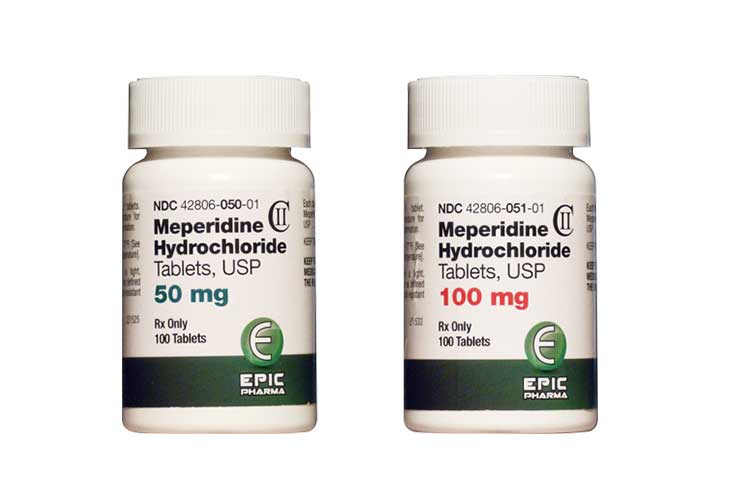Demerol Dosage Info | 50-150 mg

Medically Reviewed By: Manish Mishra, MBBS
A typical starting dosage of Demerol for moderate to severe pain would likely be 50-150 milligrams every 3-4 hours. However, always follow the specific dosage prescribed to you.

The synthetic opioid meperidine hydrochloride (meperidine HCL), also known as pethidine or the brand name product line Demerol, is prescribed to treat moderate to severe pain and, less commonly, chronic pain.
Meperidine is a relatively weak opioid analgesic when compared to morphine (which is 7-10 times more potent than meperidine by weight) or even stronger opioids like fentanyl. Its potency is generally similar to tramadol.
However, meperidine should always be used as prescribed due to its potential for side effects, adverse reactions, hazardous drug interactions, and its high risk of addiction, physical dependence, and drug abuse.
Typical Demerol Dosages (Oral/Parenteral)
The amount of meperidine prescribed to any specific patient varies depending on different factors. You should only use prescription pain medications if they have been prescribed to you, strictly observing all the instructions included in your medication guide.
However, the starting oral meperidine dosage (tablet or solution) prescribed for moderate to severe pain management will likely be:
- adults: 50-150 mg every 3-4 hours as needed
- pediatrics: dosage based on body weight with use and dose determined by the prescribing healthcare provider, typically 1.1-1.8 mg / kg every 3-4 hours as needed
These figures are equivalent to typical initial Demerol injection dosages, which are provided to treat moderate to severe acute pain. Alternatively, continuous intravenous infusions can be provided at a starting dose of Demerol 15 mg / hour.
Demerol Strengths & Dosage Forms
Demerol and its generic meperidine equivalents have been produced in a variety of forms and strengths, including:
- Demerol 50 mg and 100 mg Demerol tablets
- Demerol liquid solution, 50 mg/5mL (banana flavor)
- Demerol 50mg/mL and 100 mg/mL injection solutions
Side Effects Of Demerol
The most common side effects of Demerol use may include:
- nausea
- vomiting
- constipation
- sweating
- lightheadedness
- dizziness
- drowsiness
- pain or redness (if injected)
These side effects will often improve as your body adjusts to the medication. If they persist or worsen you should let your healthcare provider know as soon as possible.
Demerol may sometimes cause certain serious side effects or adverse effects like sleep apnea, mental/mood changes, abdominal pain, difficulty urinating, changes to heart rate, tremors, seizures, and severe drowsiness, all of which should be reported to a healthcare professional.
Demerol Overdose
A meperidine overdose may cause the following signs and symptoms:
- hypotension (low blood pressure)
- respiratory depression (breathing problems)
- pale, clammy, or blue-colored skin
- pinpoint pupils
- low body temperature
- coma
A Demerol overdose can be treated using the opioid rescue medication naloxone (Narcan).
Demerol Drug Interactions
As an opioid agonist, meperidine’s mechanism of action involves the activation of opioid receptors in the central nervous system to slow nervous system activity and provide analgesia (pain relief).
However, because meperidine acts a central nervous system depressant, it can cause potentially dangerous drug interactions with other CNS depressants including:
- alcohol
- benzodiazepines
- muscle relaxants
- anesthetics
- antihistamines
- sleeping pills
- other drugs that cause drowsiness/sedation
Meperidine is also known to interact with certain drugs that increase or decrease the rate at which meperidine is removed from the body, including certain antifungals, antibiotics like linezolid, cimetidine, ritonavir, phenytoin and other drugs used to treat seizures, and others.
Demerol use is strictly contraindicated within 14 days of taking a monoamine oxidase inhibitor (MAOI), like phenelzine or others, due to the potential for a life-threatening reaction.
Finally, concomitant use of Demerol with drugs that increase serotonin levels, such as methylene blue, certain antidepressants, MDMA, and St. John’s Wort, should be handled with caution as this can cause a potentially serious condition known as serotonin syndrome.
Demerol Dosage Precautions
Demerol should be used by caution by those with a history of:
- head injuries
- breathing problems like chronic pulmonary disease or sleep apnea
- gallbladder disease
- hepatic or renal impairment
- mental health or mood disorders
- gastrointestinal problems including paralytic ileus
- pancreatitis
- urinary retention
- tachycardia and heart problems
- substance use disorder
Additionally, the drug can cause unsteadiness and impairment that can make it unsafe to get up, operate machinery, or drive, especially in elderly patients.
Other potential complications and precautions associated with Demerol use include:
- allergic reactions
- adrenal gland problems including low appetite, fatigue, and weight loss
- normeperidine toxicity, a dangerous buildup of normeperidine’s active metabolite
Meperidine is generally not recommended for use during pregnancy or breastfeeding as it may cause neonatal opioid withdrawal syndrome or otherwise harm the baby.
Demerol Withdrawal & Discontinuation
Those who use Demerol over a prolonged period of time or who abuse this medication are at an increased risk of developing physical dependence and experiencing uncomfortable withdrawal symptoms during discontinuation.
These symptoms can be managed through replacement therapies or with the services of a medical detox program.
To learn how we treat prescription opioid addiction on an inpatient basis, please contact us today.
- Food and Drug Administration (FDA) — DEMEROL TABLETS AND ORAL SOLUTION HIGHLIGHTS OF PRESCRIBING INFORMATION https://www.accessdata.fda.gov/drugsatfda_docs/label/2017/005010s055lbl.pdf
- National Library of Medicine: MedlinePlus — Meperidine Injection https://medlineplus.gov/druginfo/meds/a601155.html

